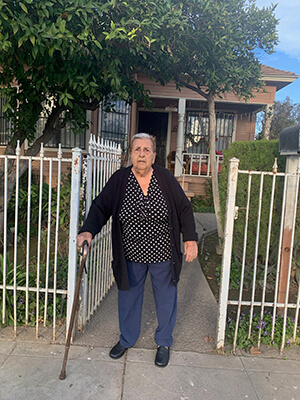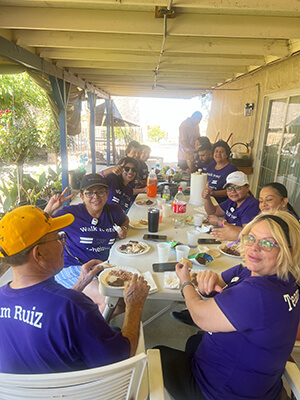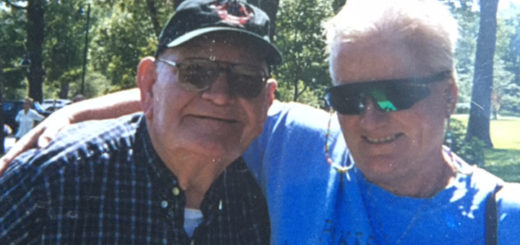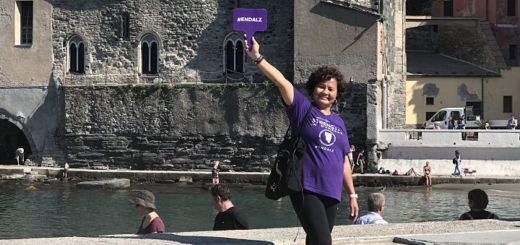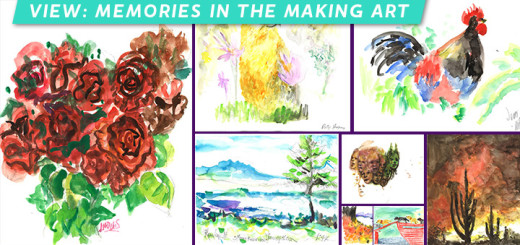Fresno woman’s mission is to educate Hispanic community on dementia
Floripez Mitchell is an Alzheimer’s Association® volunteer in Fresno whose mother is living with Alzheimer’s. When her mother was first diagnosed, she had never heard of Alzheimer’s disease and just assumed this is what happens when you get old. After the diagnosis, Floripez connected with the Association and wanted to bring her newfound knowledge to the Hispanic community. Now Floripez helps to educates hundreds in her community and also encourages others to participate in her local Walk to End Alzheimer’s.
Vibrant Mom before her Alzheimer’s diagnosis
Esperanza was a hardworking go getter who immigrated to the United Sates in the late 1960s. Hoping for a better life, she slowly moved each of her seven children to the U.S., bringing Floripez, her youngest daughter, first.
Once in the U.S. Esperanza found work at farms in the Fresno area picking grapes, oranges, lemons, blackberries and peppers. In the hopes of teaching her daughter valuable skills, Esperanza brought Floripez with to work so she could learn how to pick fruits and vegetables too. Eventually, Esperanza moved on to packing turkeys and then walnuts. Ever resourceful, she would wake up early to make burrito to sell on the side.
Signs
Of Esperanza’s seven children, Floripez was the closest to her mother. However, because Floripez had never heard of Alzheimer’s disease she didn’t really worry too much when her mother stopped tending to the garden or crocheting. When Floripez asked her mother about it, Esperanza said she was just tired.
Esperanza started making comments to Floripez about being late for school and treating her like a teenager, despite the fact that Floripez was now a married adult. However, it wasn’t until Esperanza started repeating the same questions over and over that Floripez decided it was time to see a doctor.
“The doctor said it was Alzheimer’s disease,” said Floripez. “I didn’t know what Alzheimer’s was, I thought it was an old timer’s disease with age. The doctor said it would progress as she got older. The doctor didn’t prescribe any special medicine and didn’t say to take her to a specialist.”
According to the Alzheimer’s Association 2021 Alzheimer’s Disease Facts and Figures special report, 57% of Hispanic Americans believe that significant loss of memory or cognitive abilities is a “normal part of aging.” Hispanic Americans are 1.5 times more like to have Alzheimer’s or another dementia and are twice as likely to say they would not see a doctor if experiencing thinking or memory problems. Additionally, 20% of Hispanics say they would feel insulted if a doctor suggested a cognitive assessment.
Moving in with mom
For the first three years, Floripez’s brother lived with their mother and helped care for her. Sadly he died leaving Floripez to become the primary caregiver for Esperanza. In early 2021 Esperanza had a stroke and could no longer be left alone. Floripez moved into her mother’s house and, to this day, continues to provide around the clock care for her mother.
Floripez reached out to the Alzheimer’s Association to learn more about how to best care for her mom. One of the resources she found was a one-time respite grant. Respite care involves short term or temporary care of the sick or disabled for a few hours or weeks, designed to provide relief to the regular caregiver. Floripez contacted the 24/7 Helpline at 800.272.3900 and was encouraged to apply. She was awarded a small amount of money which gave Floripez the ability to spend some time away from her mother.
Many caregivers find themselves with so many responsibilities that they neglect taking good care of themselves. However, it is important to stay physically and emotionally strong in order to take better care of your loved one. “I take care of myself when I need to,” said Floripez. “When I want to get out I get someone I trust to stay with mom for a few hours to do my nails go to bank and groceries, just to get out of the house. Take care of mom while I’m out and about.”
Volunteering with the Association
Floripez wanted to give back to her community by helping educate the Hispanic community – in Spanish – on the disease she had originally known nothing about. Volunteers make an invaluable difference in the lives of people facing Alzheimer’s and dementia and so Floripez decided to become a community educator.
Community Educators are volunteer public speakers who provide Association education programs to community audiences. “Every time I do a class I [learn] something new,” said Floripez. “[Being a caregiver] is hard. My mother is 94. I’ve been seeing her go through all these changes. My favorite part is sharing what I know to the best of my knowledge. I’m not an expert, I’m here to teach and I’m going to learn with you. We as Hispanics are at a higher risk, especially women, and we need to get educated. When I get them flyers and I see them reading it, I know I’m getting their attention. I like that.”
Floripez uses her volunteer time as a way to get herself out of her house and doing something fun. “I need to get out whenever I can,” said Floripez. “It’s hard because [I have to pay] out of my pocket when I’m gone. I’m not complaining, I do volunteer work and I enjoy it. I love volunteering with the Alzheimer’s Association. Whatever I can do I’m there.”
Participating in Walk
Last year, Floripez and her family learned about the Alzheimer’s Association Walk to End Alzheimer’s® in Fresno. Walk is the world’s largest fundraiser for Alzheimer’s care, support and research. This inspiring event calls on participants of all ages and abilities to join the fight against the disease.
With her large family, Floripez set out to raise $1,000. She hosted different gatherings that included food and games. She’d charge people to eat and play so she could hit her goal, which she exceeded. “I got a team of about 20 people to walk with me,” said Floripez. “We have gatherings and play different games. I made food and have them donate and charge them to do different things. It was fun and I wish mom would have been there, but she can’t get out of the house.”
This year Floripez is doing the same thing of hosting parties and inviting friends and family. She charges $10 a plate and $10 a card. “I made chicken mole and Mexican rice,” said Floripez. “I told [everyone] it’s not free. We played Lotería (a game like bingo). We raised $284.”
Raising funds
The money raised from Walk makes a difference in the lives of those facing Alzheimer’s. Knowing this, Flroipez encourages others to donate to the Association. “We all have parents, and we all have families, you never know when you’re going to need an organization like this,” said Floripez. “I know [the Association] is there if I have questions or need help. They have the professional connections we can count on. Being Hispanic and knowing also that Hispanics are at higher risk, why not donate? Why not help?”
Tender love and care
For caregivers just starting on this journey, Floripez reminds them to be patient, loving and understanding. “Now that I’m learning more, [I know] you cannot argue with [the person living with the disease],” said Floripez. “My mom will call me a different name. At first, I’d tell her, ‘Mom, I’m not Maria, I’m your daughter Floripez, don’t you remember me?’ [She’d reply], ‘No, I don’t remember you.’ And she’d start crying. I had to rephrase. ‘I’m here what do you need?’ I just go with what she’s asking me.”
Floripez also encourages new caregivers to do the activities their loved one likes to do. Esperanza likes to play Lotería and can still name most of the images on the card. Floripez will help her mother play. “I can call the name [of the image on the Lotería card],” said Floripez. “I do it to get her mind off of other things. I tell her to look at her card, and [usually] she’s winning.
“We just have to be patient and help them the best way they can. Just caring for our parents or family member whoever needs that help. Never argue or contradict them. Unless they’re in danger. [Just give them] tender love and care.”
You can join Floripez’s team, Team Ruiz, or start your own team for Walk to End Alzheimer’s – Fresno-Madera on October 21. Not in Fresno? Find a Walk near you at alz.org/walk.
The Alzheimer’s Association website is available in Spanish and can be found at alz.org/espanol. Register for Walk using our Spanish website here.
More information:





